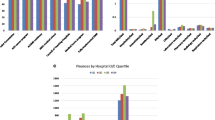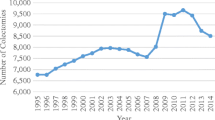Abstract
Purpose
The aim of this study was to evaluate the laparoscopic approach and pre- and postoperative conditions as predictors of 30-day mortality and morbidity in elective colectomy.
Methods
Elective colectomies were identified in the 2005–2008 American College of Surgeons National Surgical Quality Improvement Program database. Multivariate logistic regression was used to model 30-day mortality and morbidity following elective colectomy. Propensity scores were calculated to decrease selection bias.
Results
During the period studied, 14,321 patients underwent open colectomy and 10,409 underwent laparoscopic colectomy. Factors that significantly influenced mortality included male gender [odds ratio (OR) 1.4, confidence interval (CI) 1.07–1.9]; age (OR 1.07, CI 1.05–1.08); comorbidities including dyspnea, ascites, congestive heart failure, dialysis, or disseminated cancer; and postoperative conditions including reintubation (OR 2.6, CI 1.6–4.0), renal failure (OR 3.8, CI 2.1–6.9), stroke (OR 6.44, CI 2.4–17.6), and septic shock (OR 13.1, CI 8.76–19.4). While laparoscopy was not independently associated with mortality, it was associated with decreased postoperative morbidity including reintubation (OR 0.74, CI 0.59–0.91), renal failure (OR 0.60, CI 0.4–0.91), septic shock (OR 0.74, CI 0.59–0.92), wound infection (OR 0.58, CI0.44–0.77), and pneumonia (OR 0.71, CI 0.59–0.86).
Conclusions
Based on this analysis, laparoscopy was associated with a decrease in 30-day postoperative morbidity for colectomy. However, after adjusting for preoperative comorbidities and postoperative morbidities, laparoscopy did not independently influence mortality after colectomy.
Similar content being viewed by others
References
Jacobs M, Verdeja J, Goldstein H. Minimally invasive colon resection (laparoscopic colectomy). Surg Laparosc Endosc Percutan Tech. 1991;1(3):144–150.
Rea J, Cone M, Diggs B, Deveney K, Lu K, Herzig D. Utilization of laparoscopic colectomy in the United States before and after the Clinical Outcomes of Surgical Therapy (COST) Study Group trial. Ann Surg. 2011;254(2):281–288.
Allardyce RA, Bagshaw PF, Frampton CM, et al. Australian and New Zealand study comparing laparoscopic and open surgeries for colon cancer in adults: Organization and conduct. ANZ J Surg. 2008;78(10):840–847.
Bilimoria KY, Bentrem DJ, Merkow RP, et al. Laparoscopic-assisted vs. open colectomy for cancer: Comparison of short-term outcomes from 121 hospitals. J Gastrointest Surg. 2008;12(11):2001–2009.
Clinical Outcomes of Surgical Therapy Study Group. A comparison of laparoscopically assisted and open colectomy for colon cancer. N Engl J Med. 2004;350(20):2050–2059.
Guillou PJ, Quirke P, Thorpe H, et al. Short-term endpoints of conventional versus laparoscopic-assisted surgery in patients with colorectal cancer (MRC CLASICC trial): Multicentre, randomised controlled trial. Lancet. 2005;365(9472):1718–1726.
Lacy AM, Garcia-Valdecasas JC, Delgado S, et al. Laparoscopy-assisted colectomy versus open colectomy for treatment of non-metastatic colon cancer: A randomised trial. Lancet. 2002;359(9325):2224–2229.
Veldkamp R, Kuhry E, Hop W, et al. Laparoscopic surgery versus open surgery for colon cancer: Short-term outcomes of a randomised trial. Lancet Onc. 2005;6(7):477–484.
Senagore AJ, Stulberg JJ, Byrnes J, Delaney CP. A national comparison of laparoscopic vs. open colectomy using the national surgical quality improvement project data. Dis Colon Rectum. 2009;52(2):183–186.
Cone M, Diggs B, Dolan J, et al. Dramatic decreases in mortality from laparoscopic colon resections based on data from the nationwide inpatient sample. Arch Surg. 2011;146(5):594–599.
American College of Surgeons National Surgical Quality Improvement Program. http://www.acsnsqip.org/main/programspecs/program_case_inclusion_exclusion.jsp. Accessed 14 April 2011.
Newgard CD, Hedges JR, Arthur M, Mullins RJ. Advanced statistics: The propensity score—A method for estimating treatment effect in observational research. Acad Emerg Med. 2004;11(9):953–961.
Steele SR, Brown TA, Rush RM, Martin MJ. Laparoscopic vs open colectomy for colon cancer: Results from a large nationwide population-based analysis. J Gastrointest Surg. 2008;12(3):583–591.
Khuri SF, Henderson WG, DePalma RG, et al. Determinants of long-term survival after major surgery and the adverse effect of postoperative complications. Ann Surg. 2005;242(3):326–341.
Conflict of Interest
There are no conflicts of interest or disclosures.
Author information
Authors and Affiliations
Corresponding author
Rights and permissions
About this article
Cite this article
Cone, M.M., Herzig, D.O., Diggs, B.S. et al. Effect of Surgical Approach on 30-Day Mortality and Morbidity After Elective Colectomy: a NSQIP Study. J Gastrointest Surg 16, 1212–1217 (2012). https://doi.org/10.1007/s11605-012-1860-3
Received:
Accepted:
Published:
Issue Date:
DOI: https://doi.org/10.1007/s11605-012-1860-3




